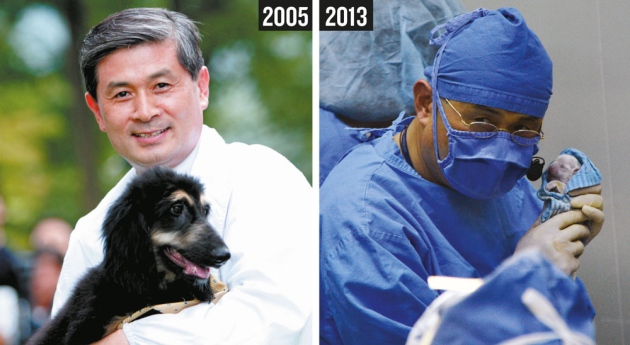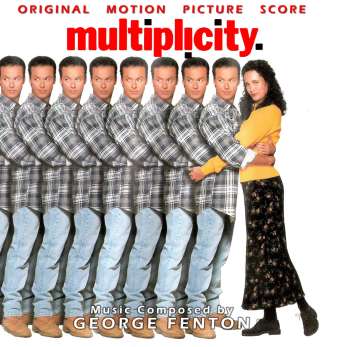Think of a time you’ve ever needed a hand. No, not just a helpful friend who’s willing to feed your cat when you’re on holiday. A real hand- those five fingered things at the end of your arms! It’s not common to need a new body part, but the probability of someone needing a replacement organ on this planet is higher than you may think. On 31 March 2015, 6,943 patients were registered for an organ transplant in the UK alone.

Mark Cahill, after transplant of cloned hand, 2013
Currently, organ donors are not meeting demand; between April 2014 and March 2015, 429 patients died while suspended on the UK’s waiting list waiting for a compatible match. In the UK, those waiting for kidneys may be on the list for 3-4 years (nhs.uk, 2015).
The problems associated with organ donation make the idea of growing organs in a lab (a process called regenerative medicine) seem ideal. Many scientists are excited at the prospect of doing so using embryonic stem cell research and therapeutic cloning techniques. Ethical considerations and the weightings given to them are dependent on the background beliefs and responsibilities of certain groups of people. Indeed, scientific institutions will outline their view pointing to factors such as medical progress and risk. This is in contrast with the views of religious peoples who base their views on spiritual factors or alongside religious doctrine. This is why the ethical points of the debate below are outlined by the groups to whom they belong. These include scientific institutions, religious groups, governments, the public and media.
Scientific Institutions and their options:
Using embryos and the goal of medical progress
- In order to grow organs in a lab, we use stem cells; which are cells that are undifferentiated. This means that they have the potential to become many different types of cells and therefore, organs. Stem cells sourced from adults are already used to effectively treat certain diseases- such as the use of blood stem cells to treat leukaemia.
- However, as specified by Dan Kaufman of the University of Minnesota Stem Cell Institute, adult stem cells are ‘limited to treating only a narrow range of diseases’ unlike embryonic stem cells as they don’t have the same pluripotency. This means that they can’t become any type of cell like embryonic stem cells and are therefore less useful for the purpose of creating organs. Embryonic stem cells are also safer to use because they are 100% free from genetic diseases. But the fact that these procedures entail the destruction of embryos, with the potential to become a human child, means many institutions are wary to support this cause (thesurvivaldoctor.com, 2013.)
Using existing embryonic stem cell lines
- Embryonic stem cells have the power to divide and multiply themselves. They form stem cell lines which are not technically a part of the original embryonic source. Although they are originally sourced from destroyed embryos, it can be argued that we might as well use existing cells.
Leftover embryos from IVF and the issue of consent
- Many people take the view that these leftover embryos from IVF (In Vitro Fertilization) should be used in research as they would otherwise be destroyed.
- However, we need consent of the parents of leftover IVF embryos; therefore it would be difficult to enforce the systematised use of leftover IVF embryos. The Eurobarometer “Biotechnology” in 2010 suggests that 80% of EU citizens supported embryonic stem cell research (Malley, 2014). This has gone up dramatically from 53% in 2005. While this portrays an increase in support for use of embryos for research purposes- it does not eradicate the issue of seeking individual consent.
Therapeutic Cloning- the future of compatible organs and better healthcare?
In therapeutic cloning, the embryo is created by taking a nucleus from a patient’s cell and putting it into a donated egg cell, then letting it grow into an early stage embryo. This technique creates genetically compatible stem cells which are more likely to be accepted by patients.
- However, there is controversy surrounding the idea of creating an embryo especially for its destruction- does this undermine its value? Is this embryo worth the same as an embryo created through IVF?
- In trying to source IVF embryos, women have been exploited for their egg cells. This occurred during the ‘Hwang Debacle’ where scientist Dr Hwang coerced his female lab assistants into donating eggs for cloning research (Nature, 2005). Some clinics offer women free IVF treatment for their egg cells- this distorts the freedom of choice for women who would be tempted by this offer (George, 2007).
- Egg cell extraction is also not a risk free procedure. Studies have shown that up to 10% of women who undergo the procedure, which includes hormonal therapy and the use of anaesthesia, develop ‘ovarian hyper-stimulation syndrome’ (OHSS). This can lead to hospitalization.

Dr Hwang with his cloned dog.
Religious views:
Below are some religious views dependent on the use of embryos and the beginning of life. The ethical and moral views sustained by their arguments can be held by anyone (Hug, 2006).
Christianity
- Many conservative Christians, oppose the destruction of embryos since this would count as the murder of a full human being. They believe that life starts at conception. Christians also believe that we do not have the right to ‘play God’, and God must remain the sole Creator.
Islam
- Whilst many Muslims contest the use of embryos, some Islamic scholars re-interpret religious text and conclude that cloning certain parts of the human body for medical reasons should not be prohibited. They would allow cloning using embryonic stem cells by God’s instruction to respect the sanctity of life and preserve it.
Judaism
- Jewish scholars maintain mixed views on the start of life and their position on cloning. Intriguingly, some have sought scientific understanding of the cloning process to base their moral decisions, some look to Jewish scriptures. Orthodox rabbis and many Jews appreciate the possible medical benefits of cloning and so often hold middle-ground views on the topic.
Buddhism
- Buddhist practice allows the individual to come to their own view but also demands respecting the sanctity of life. Many Buddhists do not see human cells, so far removed from a whole organism, as ‘living’. Therefore, the destruction of embryos (made up of a few human cells) and part of the human cloning process are not seen as morally intolerable. Intention and purpose is vital. Cloning for medical benefit is seen as ethical but commercial aims are not.

Irish Christian pro-life protest against cloning research.
Governments:
Concern on Need for Medical Progress
Many Liberal governments wait on scientific progress to advance the cloning process until it is more ethically acceptable, then subsequently change their laws because they prioritise medical progress.
- The Human Embryology and Fertilisation Act 2001 extended use of cloning human matter to research into serious diseases after cloning methods were developed which involve less manipulation of human matter. Even the religiously conservative Jordanian government as recently as 2014, legalised therapeutic cloning research for the sake of medical progress.
- To read on split MP opinions, see: http://news.bbc.co.uk/1/hi/uk_politics/882616.stm
Public and Media:
Politicised Public Groups on Social Divide
- The UK group Centre for Genetics and Society work alongside scientists and civil society leaders to promote ‘beneficent medical applications’ of human cloning technology. They oppose ‘applications that objectify… human life’ (CGS, 2015).
- They also emphasise the risk of the potential ‘division [of] human society’ over this controversial issue. This group serves to mediate the debate dominated by the few, reminding them to consider the spectrum of the public’s stance, including extremes.
The Public Spectrum and Media Manipulation:
- The Wellcome Trust’s 1998 broad report on Public Perspectives on Human Cloning demonstrates that media slants on cloning events can influence public opinion (King & Muchamore, 1998). For example, the BBC’s article on the ‘revolutionary’ discovery of the Crispr-9 gene editing method in 2014 which could eliminate some inherited illnesses could liberalise public views on human cloning (BBC, 2015)
- Conversely, other media sources merely reflect popular views of the time. ‘Gattaca’ portrays dangers of reproductive cloning (often thought to follow therapeutic cloning) whilst ‘Multiplicity’ shows the exciting new paths of science. These are not serious information providers but they mostly serve to start the ethical debate.

1997 film ‘Gattaca’ on the future of gene editing and designer babies

1996 film ‘Multiplicity’
What does this reveal about the ethical debate?
So which side are you on? It’s hard to decide and progress is piecemeal and occurs over decades. Everyone from individuals, religious peoples, scientists and the government struggle to reach decisions on the broader options presented by human cloning- from existing embryo stem cell lines to IVF embryos or the mere manipulation of human matter- crucial to the cloning process. These present a deeper range of ethical issues and widen the spectrum of views with it. Furthermore, issues on opinion and their translation into policy (for both governments and institutions) are compounded by problems from the exploitation of women to media influence. As the debate rages on- lend some thought to this ethical debate… even if you can’t lend a hand!
Word Count: 1484
Disclaimer: Any opinions expressed within this blog are the opinions of the author(s) and not those of University College London. This blog does not represent or endorse the accuracy or reliability of any information, content or advertisements contained on, distributed through, or linked, downloaded or accessed from any of the services contained on this website. You hereby acknowledge that any reliance upon any materials shall be at your own risk. This blog reserves the right, at its sole discretion and without any obligation, to make improvements to, or correct any error or omissions in any portion of the service or the materials.
Bibliography:
- nhs.uk, (2015). Kidney transplant – Waiting list – NHS Choices. [online] Available at: http://www.nhs.uk/Conditions/Kidney-transplant/Pages/When-it-should-be-done.aspx [Accessed 18 Dec. 2015].
- thesurvivaldoctor.com, (2013). Embryonic Stem-Cell Research: Experts Debate Pros and Cons. [online] Available at: http://www.thesurvivaldoctor.com/2013/02/14/doctors-debate-embryonic-stem-cell-research-pros-and-cons/ [Accessed 18 Dec. 2015].
- ‘J’, (2014). [online] Available at: • http://www.eurostemcell.org/faq/what-does-public-think-about-stem-cell-research [Accessed 18 Dec. 2015].
- Nature, (2005). [online] Available at: http://www.nature.com/news/2005/051219/full/news051219-3.html [Accessed 18 Dec. 2015].
- George, K., (2007). What about the women? Ethical and. policy aspects of egg supply for cloning research. Reproductive Biomedicine Online. [online]. 15(2), pp.127-133.
- Hug, K., (2006). Therapeutic perspectives of human embryonic stem cell research versus the moral status of a human embryo- does one have to be compromised for the other? Medicina (Kaunas). [Online].42(4), pp.107-113 [Accessed 2 December 2015]. Available from: http://www.eurostemcell.org/files/Hug_Medicina%20(Kaunas)%202005%3B%2041(12).pdf
- BBC, (2000). BBC News | UK POLITICS | MPs divided on cloning. [online] bbc.co.uk. Available at:http://news.bbc.co.uk/1/hi/uk_politics/882616.stm%5BAccessed 15 Dec. 2015].
- CGS: Genetics and society, (2015). CGS : About Us. [online] Available at: http://www.geneticsandsociety.org/article.php?list=type&type=10 [Accessed 15 Dec. 2015].
- King, S. and Muchamore, I., (1998). Public Perspectives on Human Cloning: A social research study.[online]. The Wellcome Trust Publishing Department: London. [Accessed 2nd December]. Available From: http://www.wellcome.ac.uk/About-us/Publications/Reports/Public-engagement/wtd003422.htm
- BBC (2015). CRISPR: revolutionising genetics, Editing the Human Genome, Newshour Extra – BBC World Service. [online] Available at: http://www.bbc.co.uk/programmes/p0398gb6 [Accessed 18 Dec. 2015].
We really enjoyed your opening sentence; it grabbed the reader’s attention, which encourages them to keep reading. We also really found the use of subtitles throughout the blog post to help the reader keep up with the flow of ideas, especially for a scientific topic like this. This is also the same for the use of bullet points, which summarizes points well. In our opinion, the language used is appropriate and it was a good choice putting certain key phrases in bold.
A small point is that two of your pictures seem to be overlapping. This may be intentional or it may be the way the blog turns out on different laptops but maybe you should try and double check?
Overall, well done!
LikeLike
We found your article to be very accessible, owing to the concise structure, and use of appropriate vocabulary. Your points were well supported and key terms were clearly explained. Similarly, the highlighting of certain terms in bold allowed for easy comprehension.
We felt that you remained rather impartial to your blog content and would prefer to see an inclusion of your personal argument. Perhaps this could be done by stating your opinion at the end of each section or in the conclusion which is slightly generalized at present. We would also value the introduction of all the aspects of ethics to be explored at the very beginning of the article. Furthermore, perhaps you could include a short bibliography to reinforce your use of data. Though your discussion of ethics was very compelling it may be useful to qualify arguments with the science from which these dilemmas have arisen. We did find that your article was quite one sided, however we understand this may be due to the fact that the topic is very subjective.
– Group 2
LikeLike
Thank you for commenting, we really appreciate your thoughts! We have included a bibliography. Also, the introduction now includes an outline of how and why we are setting out the various ethical views relevant to the debate as we are. We felt that these were best expressed by grouping views according to whom they belong. These are religious groups, the government, scientific institutions, the media and the public.
However, we have not qualified ethical points with scientific fact further. We feel that science cannot be used to ‘qualify’ all ethical arguments- this is especially true for religious groups. Certain groups do consider scientific facts when considering a course of action, but it does not always change the overall shape of the ethical argument. We have already included the examples of the UK government which relaxed policy on cloning research after a scientific breakthrough, and who also consider ethical issues. Also, the public opinion may change in response to media portrayals of cloning events. This is the extent to which scientific changes can impact any decisions made inclusive of ethical considerations.
Finally, we have also decided not to include our opinion on the debate because the purpose of the article is to invite the reader to consider the entire spectrum of the debate and form their own opinion.
LikeLike
We found your first sentence to be very clever in the way in which it grabbed the readers attention immediately. We also liked how you included specific statistics and references to scientists and professors who have expertise in the areas in which you are discussing. Your blog flowed well and the subheadings made it easy to see and understand what the audience is reading about.
A few suggestions for improvement; in the final bit when discussing the public spectrum and media manipulation, you state that the public’s views can be manipulated by media, which we agree with, however you don’t really suggest how. If you could just add one sentence in about a media event example that led to a change in views, for example (not related to your topic) the healthy yoga/juicing trend which has been spread via instagram.
Also, a few sentences could be tidied up to make them slightly clearer. For example where you say cloning techniques should be honed until they can be done ‘ethically’, we think it is important that you highlight exactly what you mean by ethically, so that the public reading this would know.
Overall a very enjoyable and informative blog, congratulations!
LikeLike
Let us start by saying the introduction to your blog was very clever, and immediately engaging. We like your use of humour, the clear structure of the blog and the fact that your writing style is easy to understand and focussed. Here are 3 points which we feel you could address to improve the blog even further:
1) You have covered an impressive amount of varied material and therefore it would be in your interest to facilitate the ease of the reader’s consequent learning through the inclusion of hyper-links. This would demonstrate you are actively encouraging the reader to “lend some thought to this ethical debate” through the furthering of their knowledge.
2) Both your quantity and quality are of a high standard, as previously mentioned. However, the quantity covered led to a somewhat weak conclusion. While you assert there are many different viewpoints, you do not conclude any information as such, simply describe the existence of variation between religious and political groups. When one finishes any piece of reading they should ideally be left with a clear question or idea, neither of which are definitively provided.
3) Very few examples can be provided to exemplify this final suggestion, however, words such as ‘pluripotent’ are relatively science-specialist and therefore require definition to facilitate the ease of reading. Complex language could simply confuse and discourage any potential reader from indulging in your blog. Therefore to embrace the informal nature of this piece of writing, it is advised to expand upon any phrase will a potential for being misconstrued.
LikeLike
Thank you for your comments- we very much appreciated them! We hope that the expanded definitions for science-based terms such as ‘pluripotency’ satisfactory, and that this helps your ease of reading and understanding. Furthermore, we have indeed included a bibliography and a link to an extra source so that you may learn more about the debate or read more about the current ethical points presented in the blog.
We would like to highlight the fact that the purpose of our blog was to invite the reader to form their own conclusions and opinions having been introduced to the broad spectrum of the debate. To this end, we hope that we provided you with a nuanced look at the specific points- aided by the inclusion of a bibliography. But we also hope that we have allowed you the space to form your own thoughts on this complex and topical issue!
LikeLike